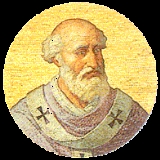
Pope Urban II
Overview
Pope Urban II born Otho de Lagery (alternatively: Otto, Odo or Eudes), was Pope
from 12 March 1088 until his death on July 29 1099. He is most known for starting the First Crusade
(1096–1099) and setting up the modern day Roman Curia
, in the manner of a royal court, to help run the Church.
Pope Gregory VII
named him cardinal-bishop of Ostia ca. 1080. He was one of the most prominent and active supporters of the Gregorian reform
s, especially as legate
in Germany in 1084, and was among the few whom Gregory VII nominated as possible successors to be Pope
.
Pope
The Pope is the Bishop of Rome, a position that makes him the leader of the worldwide Catholic Church . In the Catholic Church, the Pope is regarded as the successor of Saint Peter, the Apostle...
from 12 March 1088 until his death on July 29 1099. He is most known for starting the First Crusade
First Crusade
The First Crusade was a military expedition by Western Christianity to regain the Holy Lands taken in the Muslim conquest of the Levant, ultimately resulting in the recapture of Jerusalem...
(1096–1099) and setting up the modern day Roman Curia
Roman Curia
The Roman Curia is the administrative apparatus of the Holy See and the central governing body of the entire Catholic Church, together with the Pope...
, in the manner of a royal court, to help run the Church.
Pope Gregory VII
Pope Gregory VII
Pope St. Gregory VII , born Hildebrand of Sovana , was Pope from April 22, 1073, until his death. One of the great reforming popes, he is perhaps best known for the part he played in the Investiture Controversy, his dispute with Henry IV, Holy Roman Emperor affirming the primacy of the papal...
named him cardinal-bishop of Ostia ca. 1080. He was one of the most prominent and active supporters of the Gregorian reform
Gregorian Reform
The Gregorian Reforms were a series of reforms initiated by Pope Gregory VII and the circle he formed in the papal curia, circa 1050–80, which dealt with the moral integrity and independence of the clergy...
s, especially as legate
Papal legate
A papal legate – from the Latin, authentic Roman title Legatus – is a personal representative of the pope to foreign nations, or to some part of the Catholic Church. He is empowered on matters of Catholic Faith and for the settlement of ecclesiastical matters....
in Germany in 1084, and was among the few whom Gregory VII nominated as possible successors to be Pope
Papabile
Papabile is an unofficial Italian term first coined by Vaticanologists and now used internationally in many languages to describe a cardinal of whom it is thought likely or possible that he will be elected pope. A literal English translation would be "popeable" or "one who might become pope".In...
.
Unanswered Questions

